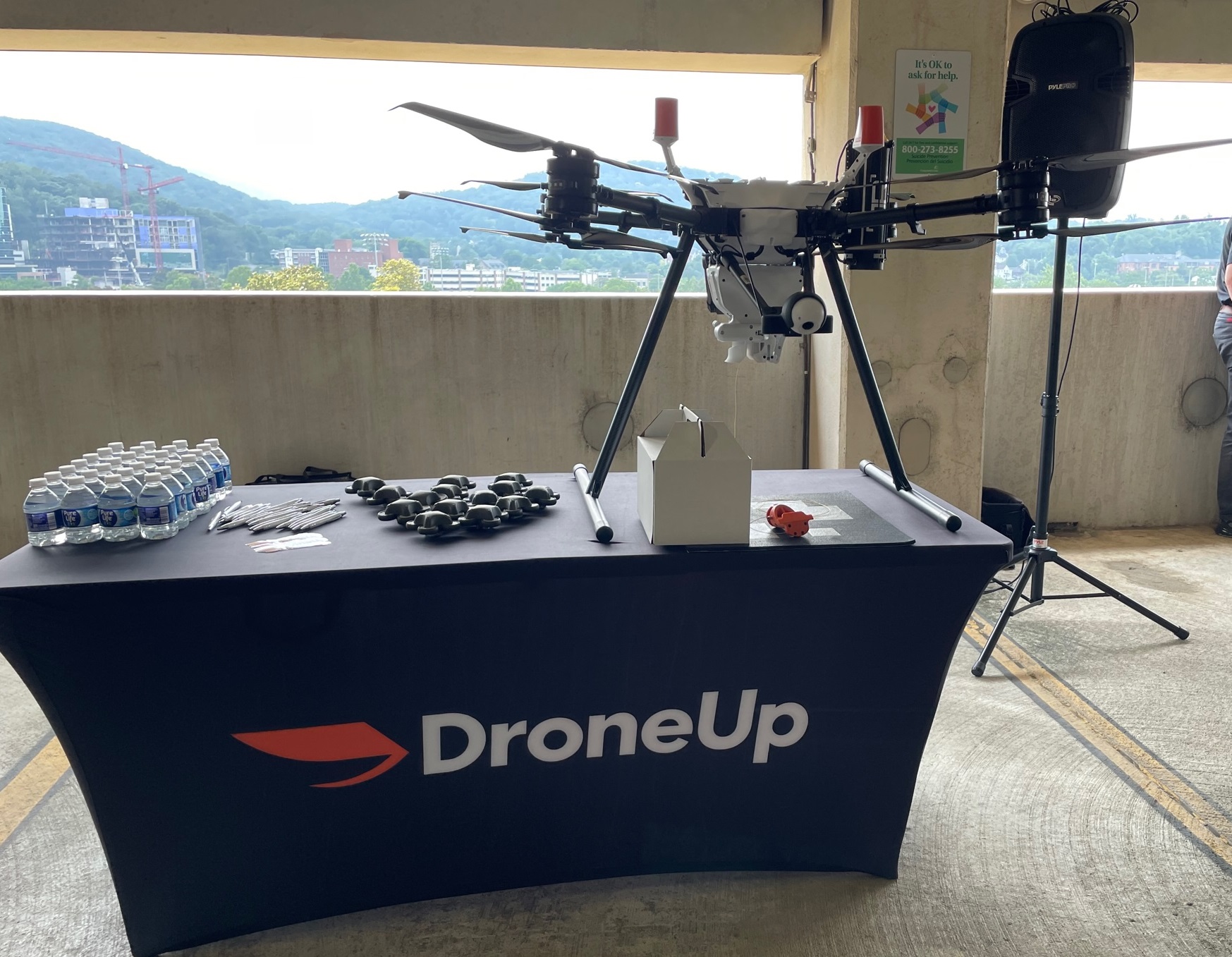As much of America has spent 2020 in quarantine and avoiding contact with each other, the idea of using drones to get what you need has gained momentum.
But even as the masks fell and trips to downtown were no longer frowned upon, the buzz around drones didn’t wane.
It was proven once again this week in a parking lot in the Roanoke Medical Services District.
The Carilion Clinic announced on Friday that it was examining what drone technology could do to help internal and external operations.
(Disclosure: The Carilion Clinic is one of our approximately 2,500 donors, but donors have no say in news decisions; see our policy.)
The Roanoke-based health system has staged a demonstration of a drone delivery service that it will spend the next three weeks studying, to determine the feasibility of shipping products over the city rather than to through her.
It’s Carilion’s latest experiment in what Paul Davenport, its vice president of emergency medicine, describes as a never-ending search for efficiency.
“Carilion Clinic as a system is very complex,” Davenport said. “There are a lot of moving parts and a lot of demand for certain things, and often there are unknown things popping up. The main thing we’re trying to do is make sense of a lot of chaos.
At a Friday afternoon press conference, Davenport joined officials from DroneUp, a Virginia Beach-based autonomous drone delivery provider, as they conducted a demonstration of DroneUp’s product.
The first assignment involved transporting a small delivery box from a Carilion warehouse on Franklin Road to its Riverside Circle campus, which is just over 1.5 miles by car.
Despite a moderate breeze, the drone completed its mission in about 5 minutes, lowering the caisson via a winch cable and then returning to its home base. Over the next three weeks, Davenport said Carilion and DroneUp will send varying sizes of cargo to locations within a 1.5-mile zone.
Davenport said Carilion is considering two possible functions for starting drones. First, he believes that internal operations could run more smoothly and labor would be utilized more efficiently if drones handled small or unexpected deliveries to the many offices and medical facilities of the health system around the Valley of Roanoke.
“What really excites us about this is that sometimes people have to [deliver] unexpected things,” he said. “It consumes our workforce; this could lead to difficulties and delays. It therefore helps us to consider the transport of small objects more efficiently. »
Second, Davenport said he hopes drones could eventually be used to send supplies to patients who may be struggling to leave their homes. He noted that some of Carilion’s operations in rural southwest Virginia, where healthcare staff are often limited and the service area is large, could benefit the most from such technology.
“Going forward, we would like to reach our rural patients,” Davenport said. “It’s really just the beginning. The real success we might see is to expand into a rural setting and provide things that patients need but can’t get, or provide things that our [rural] facilities need.
It’s one of two medically-oriented experiments DroneUp is currently running, according to Greg James, the company’s vice president of business development. He is working on a similar test with Newport News-based Riverside Health Systems.
According to a press release sent in March, the Riverside project is being carried out through a partnership that also includes Old Dominion University and the Accomack-Northampton Planning District Commission. The joint venture also received seed funding of $75,000 from the Virginia Innovation Partnership Corporation.
Carilion spokeswoman Hannah Curtis said the Roanoke Health System is exploring grant opportunities but has not yet received any.
Carilion and DroneUp started talking about the kinds of services drones could provide about 18 months ago and eventually came up with a list of possibilities.
James said using drone technology for healthcare services is a natural pivot for the company and not too different from retail, where DroneUp achieved its first success.
Just days before Thanksgiving 2021, DroneUp launched retail delivery service from multiple Walmarts in northwest Arkansas. The operation has since expanded to six more cities in five other states, including Virginia Beach and Orlando, Florida. For a $3.99 delivery charge, orders can be placed and received in about 30 minutes.
James said the most popular ordering times are around lunchtime and dinnertime.
And the most popular item? Burger helper.
“What we find is that many households will find that there is nothing in the house for dinner or maybe they are missing a few ingredients and they can’t or don’t want to go back. “, James said. “But they can place an order with DroneUp and it will be delivered in about 30 minutes.”
James said the company’s success with Walmart gave DroneUp confidence that its model is practical. With Carilion, the company hopes to see how things will work with different logistics. For example, the Roanoke operation must rely on Carilion’s medical air transport system.
An example of this occurred on Friday, when the drone demonstration was delayed by around 15 minutes while it waited for Carilion’s Life-Guard helicopter to return to the hospital after a late morning emergency. .
“What interests me to see [in Roanoke] is where we can deliver to their campus, what kind of impact does that have for their material delivery team as well as those who receive the goods,” James said. “This [type of service] is what really excites us. It is an innovation and technology that can deliver great results for a client and healthcare provider, but also for a patient. »
Once the June tests are complete, Davenport said Carilion and DroneUp will review the data and determine the next step.
“We have decades of experience in innovation and we continue to use technology for our customers,” Davenport said. “It’s just an extension of that innovation that’s continuing.”
